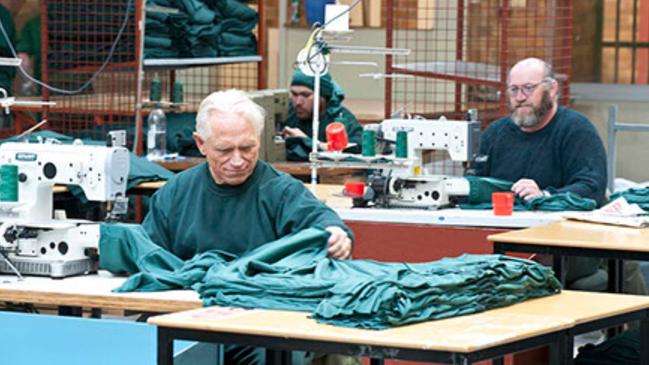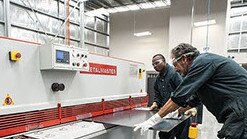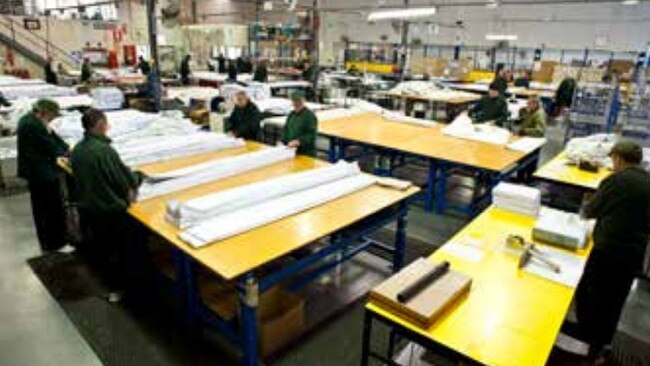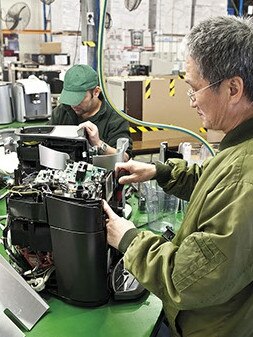NSW inmates’ paid jail jobs sparks backlash as the Aussie industries taking a hit revealed
NSW inmates have been employed to do a number of jobs earning up to $70.55 per week. It has sparked fresh complaints that criminals were undercutting the private sector. Here are the jobs prisoners are taking from Aussies.
INMATES in a number of jails including Silverwater and Long Bay are employed to repackage Qantas in flight headsets for less than the minimum wage undercutting the law abiding private sector.
The prisoners, who earn between $24.60 and $70.55 for a five day 30-hour week at the jails, including Mary Wade, have been changing the foam and repackaging headsets for all cabin classes for Corrective Services NSW since 1993.
The minimum wage is $18.93 an hour. Or, $719.20 a week.
MNH Sustainable Cabin Services is currently contracted by Corrective Services, with prison bosses saying it provides useful skills to help rehabilitate offenders.

MORE NEWS:
PM will no longer ask Turnbull to represent Australia
Medic’s anguish after girl’s ‘pointless death’
TV execs angry Wilkinson scores big interviews
But cheap prison labour used to make prison products have sparked complaints it was undercutting the private sector which cannot compete.
Sydney-based company Sunnyfield, which employs people with disabilities, lost its contract packaging the headsets to Department of Corrective Services eight years ago.


“It’s the way business deals go, we had a contract with Qantas for a while but we have now secured higher value, more meaningful, work for our employees,” Sunnyfield CEO Caroline Cuddihy said.
Disability Services Australia ditched its contract with Qantas ten years ago when it couldn’t lower the wage of its employees to match Corrective Services.
“We left Qantas because was an element of undercutting by Corrective Services plus the specialised skills needed to test the headsets meant some of our workers couldn’t do the job,” a spokeswoman for DSA said.
“We have plenty of more profitable work that suits our employees and supporting employees’ needs.”

A Qantas spokeswoman confirmed it MNH Cabin Services has a contract with CSNSW.
“We use a variety of suppliers to clean and repair our headsets, including correctional services.
“MNH has the contact with Corrective Services and they know how much the prisoners are paid.”
Convicted criminals also manufacture linen for general ward and hospital theatre rooms, theatre gowns, make underpants, T-shirts, tracksuit bottoms and shorts for convicts.
They custom-sew flags for domestic and corporate display, body bags and sports bras.
“We provide solutions to contemporary textiles industry problems. You don’t have to go offshore to source quality product and services — and we offer quick lead times,” the website for CSI, the commercial arm of Corrective Services, states.
Prisoners from St Heliers constructed the media village at the Sydney Olympics and build homes for Aboriginal communities in rural NSW.


Inmates also build office cabinets, design and craft occupational health and safety signs, makes chairs, desks and steel frames for the justice department, hotels, and school classrooms, nursing homes and clubs.
“No job is too small or too large for CSI. We provide fit-outs from small offices to complete government departments,” CSI states.
“Past CSI private sector partners have been so impressed with the level of workmanship in their business units that they have employed inmates post-release.”

They also cultivate veggie patches for inmate meal times — each year almost 120,000 kilograms of fresh beef, 338,000 kilograms of processed vegetables, 1.3 million apples, 1.8 million litres of fresh milk, one million pies and sausage rolls and 1.5 million loaves of bread are produced each year by inmates working on farms or in CSI food processing and preparation business units at Long Bay, Wellington, Mannus, Emu Plains and St Heliers correctional centres.
The vegetables grown varies from season to season and includes cabbage, broccoli, capsicum, onions, celery, potatoes, pumpkin, carrots, peas and tomatoes.
The state’s prison’s 100 commercial-based business units pulled in $137.8 million for NSW Corrective Services and a net sales profit of $13 million this financial year.
This was injected back into prisons to reduce the cost of operations.

A Corrective Services NSW spokeswoman said: “Council members come from business, trade unions and the community, and meet regularly to examine all new contracts and partnerships to make sure they do not take business or employment opportunities from the community.
“One of the aims of prison industries, where inmates make their own clothes and prepare their own food, is to substantially reduce the cost to NSW taxpayers.
“Prison industries also keep inmates constructively engaged and prevent the anti-social behaviour that can arise from idleness.”


JOBS INMATES ARE TAKING FROM AUSSIES:
• Repackage Qantas headphones
• Carpentry
• Build homes for Aboriginal communities in rural NSW
• Custom sew flags, body bags and sports bras
• Make underpants, T-shirts, tracksuit bottoms and shorts
• Manufacturing linen for general ward and hospital theatre rooms
• Cultivate veggie patches


